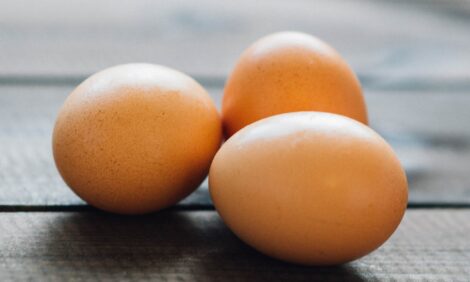



Making Eggs a Healthier Breakfast Choice
ISRAEL - The health benefits of eating eggs depends to a great extent on the hen's diet, according to research at Tel Aviv University.Eggs, one of the most commonly consumed breakfast foods in the United States, have long been a subject of controversy. Are they healthy or are they a high-cholesterol trap? The answer depends on what the hen eats, says a Tel Aviv University researcher.
Dr Niva Shapira of Tel Aviv University's School of Health Professions says that all eggs are not created equal. Her research indicates that when hens are fed with a diet low in omega-6 fatty acids from a young age – feed high in wheat, barley, and milo and lower in soy, maize and sunflower, safflower, and maize oils – they produce eggs that may cause less oxidative damage to human health. That is a major part of what determines the physiological impact of the end product on your table.
Her findings were published in Journal of Agricultural and Food Chemistry.
Cholesterol oxidation: an industry standard?
Eggs high in omega-6 fatty acids heighten cholesterol's tendency to oxidise, which forms dangerous plaque in our arteries. Dr. Shapira's research shows that eggs laid by hens with healthier feed can lessen oxidation of LDL (low density lipoprotein), the body's 'bad cholesterol'.
But healthier eggs are likely to cost more, Dr Shapira says. The price of chicken feed varies from region to region, and in many areas, feed containing products high in omega-6 fatty acids, such as maize, soy and their oils, are much cheaper for egg producers to purchase.
To test the effect of a healthier feed on the eventual composition of the egg, Dr Shapira and her fellow researchers designed feeds that were high in antioxidants and lower in omega-6 fatty acids, based on wheat, barley, and milo. The specialised feed was given to young hens which had not yet accumulated omega-6 fatty acids in their tissues, and the composition of their eggs was then tested. When researchers achieved the desired composition of low omega-6 and high anti-oxidants, the eggs were given to test participants, who were instructed to eat two of these special eggs daily. Their results were measured against daily intake of two standard grocery store eggs, and a weekly intake of only two to four standard eggs.
There were vast differences in outcome among the treatments. Daily consumption of two industry-standard eggs, high in omega-6, caused a 40 per cent increase in LDL oxidation in participants. After eating two per day of the specially-composed eggs, with both high antioxidant and low omega-6 levels, however, LDL oxidation levels were similar to the control group eating only two to four eggs a week.
Surprisingly, with the 'healthier' eggs, we might be able to eat more than twice today's generally recommended egg intake and still maintain a healthy level of LDL oxidation, Dr Shapira concludes.
Demanding a better product
The drawback is that these eggs are not widely produced. For now, consumers can only buy what the grocery store stocks.
Dr Shapira recommends that consumers demand 'health-oriented agriculture'.
She said: "In addition to factoring in the cost of the chicken feed, farmers need to think about the health of the consumer."
To produce healthy foods, they need support from local authorities and increased consumer awareness. That would help to expand access to better foods.
As her study demonstrates, consumers should beware of egg studies that draw a single conclusion about the health value of all eggs, Dr Shapira cautions, because the outcome could have a lot to do with how the egg was produced. In Europe, corn and soy are less commonly used in chicken feed, whereas in North America, these two ingredients often make up the bulk of the hen's diet.











